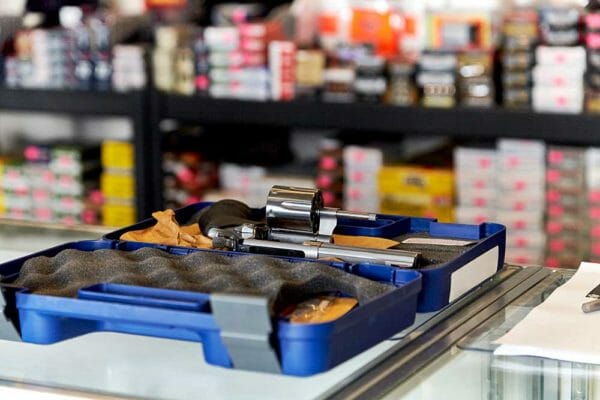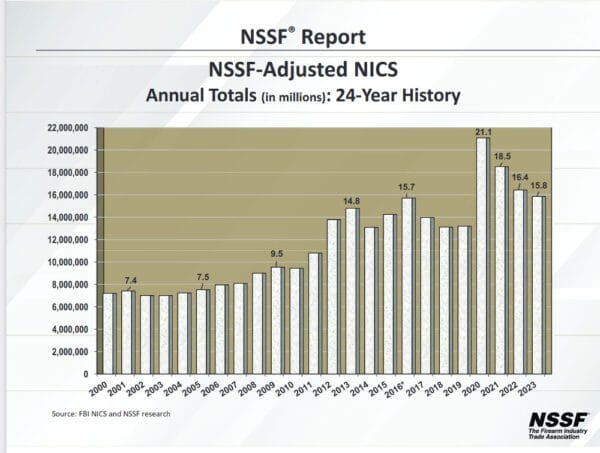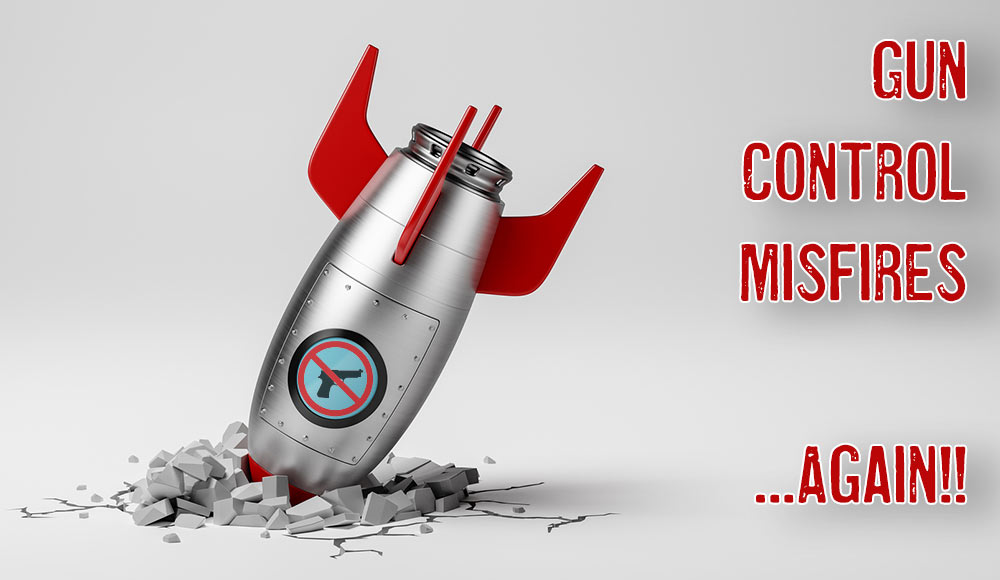
The Department of Justice has issued a press release showing that, over five years, from January 1, 2017, to December 31, 2021, the number of firearms sold by unlicensed dealers in the USA was less than 1 of 10,000 sold in the National Instant Criminal Background Check System (NICS).
According to the National Shooting Sports Foundation’s adjusted calculations during the five-year period, the number of firearms sold through the NICS system was 14 million in 2017, 13.5 million in 2018, 13.6 million in 2019, 21.1 million in 2020, and 18.5 million in 2021, for a total of 80.7 million over five years.


The number of firearms sold by unlicensed dealers during the same five-year period was 68,388 firearms. They were uncovered in 3,403 cases. 68,388 may sound like a great deal, but it is less than 1 firearm for every 10,000 legally sold through the NICS system, or .084%.
The Justice Department prefers to use the term “trafficked.” It may be more correct because some of the firearms may be traded or gifted rather than sold. Of the 68,388 firearms “trafficked” by unlicensed dealers, there were 368 cases where the firearms were used in shootings. There were 265 cases where they were used in homicides. This is over the entire five-year period. The press release gives us cases, but a case might involve more than one or more firearms. It is not clear if a case would involve more than one homicide, but it is possible. The vast majority of the cases of unlicensed firearms dealing, 58%, involved a mean of 2.3 firearms, the number of firearms recovered ranging from one to five.
There is little to indicate the investigation of the unlicensed sales prevented any homicides or any violent crime. The homicides mentioned may have been the initial event that brought the unlicensed dealer to the attention of the authorities. Tracing firearms is almost never used to prevent violent crimes such as murder, rape, or assault. Those prosecuted are involved in “process” crimes, selling firearms without the approval of the federal government.
According to statistica there were about 97,000 homicides in the USA from 2017 to 2021. The number of homicides associated with (not caused) by firearms that were sold by unlicensed dealers, according to the ATF, during the five years was 265. 265 is about .27 of one percent of the homicides committed over the five years.
The clearance rate for homicides in many US cities is getting lower and lower. When you have fewer police who are less willing to investigate crimes, fewer murders get solved. About 35 million dollars a year is wasted on a firearms tracing system, which does essentially nothing to prevent violent crimes.
The National Firearms Commerce and Trafficking Assessment (NFCTA): Firearms Trafficking Investigations – Volume Three, has eleven parts, plus a Director’s Forward and Acknowledgement. In virtually every part, a critical reader can find evidence of a very small return for the national treasure expended. For example, in part X, National Illegal Firearm Recoveries, most of the “firearms” recovered are parts kits which could be used to convert an existing firearm into an illegal firearm. You will also see 75% of the cases over the five years happened in 2019. It is clear something anomalous happened in 2019. It could be as simple as defining an object as illegal, which was previously considered legal. The eleven parts contain a large amount of information. Much of what is revealed is the relative small number of cases. Read the statistics critically, and you will be amazed at the information available.
The ATF criminal division was funded in 2019 with about 1 billion dollars. Over the five-year period of the study, the number would be about 5 billion dollars. Most of that money goes to investigating unlicensed dealers and straw purchasers. The misplaced focus is on firearms when it should be on people who commit violent crimes.
The number of people who commit the most murders in a given city is a tiny percentage of the population. From David Kennedy, the renowned criminal justice professor and co-chair of the National Network for Safe Communities:
“We now know that homicide and gun violence are overwhelmingly concentrated among serious offenders operating in groups: gangs, drug crews, and the like representing under half of one percent of a city’s population who commit half to three-quarters of all murders.”
The money thrown away in absurd bureaucratic exercises such as keeping, maintaining, and attempting to expand gun traces and gun trace databases could be used to keep track of hyper-violent criminals. Those who are known to be the most at risk for murder or being murdered are a tiny percentage of the population, much smaller than the number of firearms in society. The basic misunderstanding by the left is their confusion about cause and effect. Guns do not cause crime. Criminals only need a tiny number of guns to commit enormous numbers of crimes. Those who are prone to commit crimes must be removed from the general population. There are known ways to help people, especially young men, to refrain from the temptations of violent crime. They are:
- A stable family structure, with a strong male providing for the family.
- A strong moral structure in the community, particularly Christianity, where violence against others is discouraged. It is important for illegitimate violence to be stigmatized.
- A criminal justice system that is viewed as legitimate and appropriate. In communities where the police are respected, crime is low.
Much of the focus of Marxists/Leftists/Progressives is to remove responsibility from individuals and focus on inanimate objects. This is a recipe for disaster.
About Dean Weingarten:
Dean Weingarten has been a peace officer, a military officer, was on the University of Wisconsin Pistol Team for four years, and was first certified to teach firearms safety in 1973. He taught the Arizona concealed carry course for fifteen years until the goal of Constitutional Carry was attained. He has degrees in meteorology and mining engineering, and retired from the Department of Defense after a 30 year career in Army Research, Development, Testing, and Evaluation.







